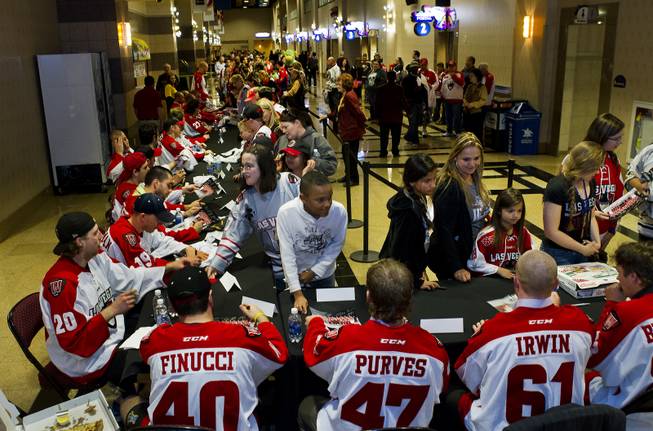
Players with the Las Vegas Wranglers Professional Hockey Club sign autographs for fans after their last home game of the regular season in the Orleans Arena on Tuesday, April 1, 2014.
Sunday, April 13, 2014 | 2 a.m.
Brendan Rempel is soaking his legs in the community spa of his Southwest Las Vegas town house development, trying to keep his body fresh for the remainder of the Las Vegas Wranglers minor league hockey season.
He’s unassuming and blends in with the residents of the community, toying with his cellphone while others walk by to get their mail or use the nearby workout facility.
Rempel, a first-year professional, graduated from Harvard last year with an economics degree and could be off pursuing a six-figure job. Instead, the 22-year-old defenseman is content chasing the dream of playing in the NHL, making around the rookie minimum of $400 weekly for the five-month season in the Double-A ECHL.
“I have the rest of my life to work,” he says.
It’s a journey where nothing is guaranteed — just 11 Las Vegas players in the club’s 10-year history have reached the NHL. That’s a lesson Rempel learned the hard way a few months into his career.
He was traded to Las Vegas by South Carolina in late January after it picked up two veterans left without a team when the ECHL franchise in San Francisco folded midway through the season.
Rempel will join Wranglers teammates later in day for a poolside barbecue, enjoying the best benefit of playing hockey in Las Vegas. It’s March and the weather is perfect, which is unlike most towns for the winter-season sport.
It’s a rare off day, but players say they don’t spent much time enjoying the distractions of the Strip or gambling. They’ve been to a few shows and buffets, receiving discounted or complimentary admission because of their affiliation with the team.
“There is more to Las Vegas than the nightlife,” Rempel said.
They’ll exchange stories about their journeys through the minor leagues, or share tales from friends playing in other cities. When the San Francisco team ceased operations, reportedly losing $2 million in the 2012-13 season, word spread about players missing weekly paychecks.
That’s not a worry in Las Vegas, which players say has some of the best accommodations in the league.
Most players are paid $600 to $650 weekly. Some have agents who charge about one week’s pay per season. If a player is released, they typically aren’t paid the rest of the season.
The team pays for players’ housing and utilities during the season at one of two complexes in Las Vegas. Younger players room two or three to a town house at Rempel’s gated complex; players with families get their own house at a complex near he Lakes. All teams in the ECHL provide free housing.
When Rempel was traded from South Carolina, he packed all of his belongings in two duffle bags. Everything else — furniture, a bed with sheets, a television and a dining set — is provided by the team. Players have to pay for food, cable and Internet.
When they are on the road, players receive $38 per day per diem, which many usually pocket because arenas usually provide a postgame meal and most hotels have free breakfast. And, after home games at the Orleans Arena, players eat for free at nearby McMullan’s Irish Pub.
“It’s a pretty good gig. I’m happy with it,” Rempel said. “It’s a couple of steps away (from the NHL), but it doesn’t hurt to be optimistic.”
The playoffs begin this week. Soon, players will be heading back to their hometowns, having to find temporary housing and an offseason job. Health insurance is provided by the players union during the season, but in the offseason players aren’t covered. Rempel is still on his father’s policy; some Wranglers will return to their native Canada, which has universal health care, and a few will continue their insurance through the union by making payments.
Some will work camps during the offseason, the best outlet to stay in shape.
Wranglers forward Geoff Irwin took last season off to start a small business. He’s developing a grip-glove for video game players, often using his down time in Las Vegas to coordinate with a business partner in British Columbia, Canada.
But Irwin, 28, isn’t ready to give up on hockey.
“I’m not sure I enjoy doing work in an office, but I still enjoy the game (of hockey) a lot,” Irwin said. “The goal of every kid growing up is to keep playing and get to the highest level.”
Since the Wranglers aren’t affiliated with an NHL team, players are free to sign elsewhere in the offseason. Some will return to Las Vegas, others will stay in the ECHL in another city and some will hang up their skates.
The life of a minor leaguer isn’t for everyone, but most won’t stop chasing the dream.
“Most of us are used to this,” Irwin said. “We’ve been traveling since (age) 16 or 17 when we were in junior hockey.”
Baseball road a bit smoother
Jordan Parraz missed a home run by a few inches.
The Arizona Diamondbacks minor leaguer launched a shot nearly clearing the outfield wall in left-center at Arizona’s Chase Field last month in a spring training game against the Chicago Cubs. It was his first at-bat in a big-league stadium after 11 years of professional baseball.
The rest of the time has been spent climbing the ladder in the minor leagues. But instead of starting this season in Triple-A Reno, one step away from the big-leagues, Arizona assigned the Green Valley High product to Double-A Mobile. The 29-year-old is one of the oldest players in Double-A and he has every right to be disappointed. But he’s not complaining.
“It’s better that I’m here,” Parraz said. “The outfield in Triple-A was too crowded. I need to get at-bats in to prove myself.”
In more than a decade of living the life of a minor leaguer, the Henderson resident has learned nothing goes according to plan.
He was a third-round pick of the Houston Astros in the 2004 draft. In 2007, he hit 14 home runs with 76 RBIs and 33 stolen bases in the Class-A, and appeared to on a fast-track to Houston. Then, he was traded to Kansas City in the offseason, triggering a career of uncertainty.
He’s played more than 900 career games and been part seven organizations.
Along the way he was on Kansas City’s 40-man roster while in Triple-A Omaha (Neb.), which paid at least $41,000 for the five-month season. Players in Triple-A for a second-year on the 40-man roster are paid at least $82,000. The rookie minimum in the big leagues is $480,000, of which players still earn a portion even if they are demoted during the season.
Players sign a six-year minor league contract when they are drafted, which details their pay through different levels of the system. There are significant differences in pay. And veterans such as Parraz are paid as little as $1,700-$2,200 monthly on their free agent contracts.
Some organizations have host families to provide rooms on a month-to-month basis. Players advancing to another level also frequently sublet their room to the player taking their roster spot.
It’s a lifestyle that’s not for everyone, but for Parraz it’s well worth the sacrifice. He just missed a home run that day in Arizona and arguably just missed a big-league call-up while with Kansas City.
He would regret not taking a chance, regardless if that winds up being another near-miss.
“Last year, I contemplated (retiring) a bunch of times,” he said. “It’s a grind and I asked myself, ‘What am I doing?’ But I still feel nervous and anxious for each at bat. That’s my body telling me to keep going. I can still reach my potential.”
Ray Brewer can be reached at 990-2662 or [email protected]. Follow Ray on Twitter at twitter.com/raybrewer21.


Join the Discussion:
Check this out for a full explanation of our conversion to the LiveFyre commenting system and instructions on how to sign up for an account.
Full comments policy